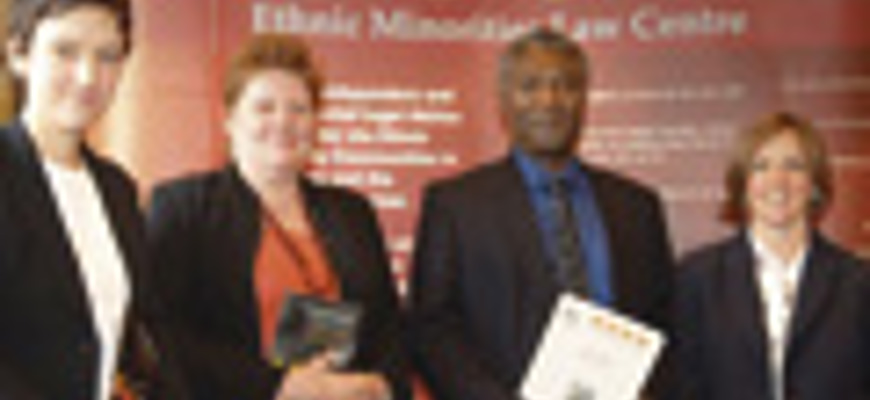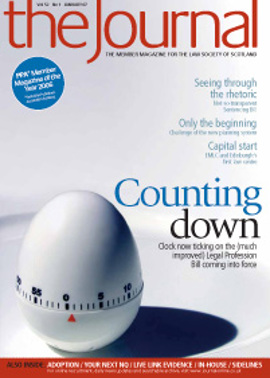Majoring in minorities

To most of the legal profession they probably don’t even show up on the radar. They support politically unpopular cases while depending almost entirely on public funding, often provided with strings attached. But to a sizeable section of the population they are the only source of help if an individual’s very presence in Scotland comes under threat.
Such is the nature of the Ethnic Minorities Law Centre, which just last month took a significant step forward when after 15 years confined to Glasgow and adjoining areas, it opened its doors also in Edinburgh. A pioneering move indeed for the capital, where not only are there very few solicitors practising in EMLC’s core fields of immigration, nationality and discrimination, but until now there has been no law centre of any description.
So how did EMLC achieve such a breakthrough? The proof of concept happened, according to Rosie Sorrell, principal solicitor in the Glasgow office since 2001, with the development of “mainstreaming” over the past two years through a project covering the North and South Lanarkshire Council areas, two of the Glasgow centre’s more committed funders over the years in its attempts to reach beyond the city. A partnership arrangement with the Lanarkshire citizens’ advice bureaux involves the two agencies in a reciprocal referral arrangement. With EMLC’s main areas of work being immigration, nationality, asylum, discrimination and employment law, and CABx handling mostly debt, money advice and welfare benefits, the two work happily together and at the same time help EMLC’s clientele into services directed towards the general population.
Mutual benefits
“Also on the training side we help CAB advisers in order to build their capacity to advise on issues that perhaps we’re more specialised in but if they’re basic enough they can actually do themselves”, Sorrell explains. “Equally they can do the same for us. That principle is something that project has been built upon and it’s been very successful. We’ve seen a massive increase in the number of clients that we’re getting through the door but also the CABx have seen an increase, which is obviously a key aspect of that partnership.”
And that, she explains, is the blueprint not just for Edinburgh, where EMLC will work in partnership with the city’s five CABx, but hopefully further afield. “We’re keen to roll out the model into other parts of Scotland too, and we’ve got a joint bid in at the moment with Citizens Advice Scotland, they’ve actually got their funding agreed, to set up a service in Inverness.”
While there are grounds for optimism that minorities in other parts of Scotland will be able to access a service hitherto denied them, it would be wrong to pretend that even a well established centre like Glasgow doesn’t have to keep going cap in hand in order to secure its funding for another couple of years.
A constant search
“It’s partly the nature of funding, you have to constantly look for new sources. Some time ago Glasgow Asylum Seekers Consortium decided not to fund legal advice for asylum work any more even though there are still asylum seekers in the city, so that obviously had an impact on us. Even though we’ve not stopped seeing the clients, we have to seek out other sources of funding to maintain our delivery of services and to have continuity of staff.”
So, for example, a new youth discrimination project has grown out of the Scottish Executive’s race equality review. Sorrell knows from experience of a similar previous project that particular issues arise for this group which may be quite different to those of older people.
“I’m not saying I’m not happy to have that new project, because I am”, she adds, “but it’s a frustration to me that we’re not just funded for the core work that we do sometimes, and that we have to reinvent ourselves to some degree.”
More positively, funded projects can help the centre reach beyond simply offering legal advice. A female support project over the past two years has been of particular help to its 300 asylum clients. “They’ve suffered traumatic experiences, they get very little in the way of emotional, counselling support, and it’s something that we just can’t really comprehend, but we got the funding through the Community Planning Partnership in Glasgow for a female support officer for women asylum seekers and refugees, and that has been of great benefit for clients.
“I was really keen to get that off the ground. I’d actually like it to be for men as well”, Sorrell explains – but that, no doubt, will need someone to offer another little pot of cash.
She is cautiously hopeful that the new Legal Profession and Legal Aid (Scotland) Bill/Act will make a difference. Though the centre has quite a good relationship with the Scottish Legal Aid Board, to date it can only provide support through a Part V project. “They have actually committed some funding to this project that we might be setting up in Inverness, but from what I understand it would broaden their powers to be able to fund organisations such as us, to carry out core work without having to say, OK we’ll start a new project whatever it might be. For us that would be a good thing because it’s a really difficult and challenging aspect of our work to be constantly seeking funding for what we’re just here to do.”
No favourites
One thing the centre has had to be careful of is to preserve itself as an agency for all minority communities. “Essentially we’re a legal practice, we’re professional and we don’t want to get embroiled in any of the politics that potentially is out there”, says Sorrell. “I think we’ve been successful on that, because you can see from the annual report the diversity of our client base is really wide. I think that’s credit to us because it shows there’s a trust and confidence that’s built up from a wide range of communities and not just a particular community.”
Sometimes indeed the centre can find itself supporting individuals against others from the same or different minority groups, and not solely in the context of domestic relationships. Bad employment practices can occur with employers from ethnic minority communities just as with indigenous employers, and Sorrell knows of cases where employees have not been paid at all, never mind below the minimum wage. Some clients who have gained refugee status and entered the employment market have moved to London, “where they feel more comfortable, which is quite sad actually, because Glasgow claims that it’s a welcoming city and it has a lot of support structures for asylum seekers, but when they have gained refugee status people are on their own, and yes they’ve got all the access to benefits and avenues of employment that anyone else has, but they’re not treated on an equal footing”.
Institutional progress
Just a few years ago the phrase “institutional racism” was frequently heard, as a series of reports criticised the treatment of ethnic minority individuals at the hands of, say, the procurator fiscal service and police. Has Sorrell noticed an improvement following the headline drive towards best practice? She agrees for example that it has become easier to request an interpreter, “but I think sometimes efforts on paper don’t necessarily translate into the impact they should have on the ground, so I think there’s still a lot of work to be done. But the will is there, and that’s obviously positive”.
Within the profession itself, she has seen limited progress for would-be ethnic minority solicitors. “There are quite a lot of people from ethnic minorities doing law degrees, but it seems to be that once you go past that level there are fewer people doing the Diploma which you need to become a solicitor. That’s where the split seems to occur. Though I think there are more women from ethnic minorities qualifying now.”
Having successfully instigated a Glasgow Immigration Practitioners Group in 2001 to encourage more private firms into that area of work, EMLC hopes to build similar relationships as it extends its network. “I hope that for example in Edinburgh something similar could be built up. Because Edinburgh’s worse, it’s got less access to these kind of services than Glasgow, and there is quite a big ethnic minority population there now.”
Indeed it seems that having made the breakthrough into the capital, EMLC could be at something of a watershed. As Rosie Sorrell sums up: “It’s rewarding because I feel that in the last few years our reputation has been built up, and I think we are getting more recognition now from people like the Executive, councils, SLAB and the Commission for Racial Equality; we’re actually being recognised for what we should be. We’ve provided a professional legal service for a long time.”
COMING FULL CIRCLE
Senior solicitor in EMLC’s new Edinburgh base is Kathleen Bolt, who until 2001 was principal solicitor in the Glasgow office. Since then her career has seen spells both with the Commission for Racial Equality and in private practice.
“I was delighted to hear that EMLC had succeeded in securing funding for a new office in Edinburgh”, she told the Journal. “Taking up the post of senior solicitor here presented a unique opportunity to deliver a new service to black and minority ethnic communities in Edinburgh, where no such provision existed. It also provided a unique opportunity to establish a law centre in Edinburgh. I was also attracted by the strategic approach that underpinned the delivery of the new service, namely working in conjunction with mainstream services such as Edinburgh CABx to develop the capacity of such organisations to meet the needs of ethnic minority communities. This in particular allowed me to build on the experience I had developed within the CRE.”
The funding for EMLC in Edinburgh is for the delivery of a core service, the provision of legal advice and representation to address the unmet legal need of the black and minority ethnic communities within the city. However the partnership work which is being established between EMLC and the local CABx is a critical component of the funding.
“Although Edinburgh and Glasgow can feel like very different cities, we suspect that the unmet legal needs of the black and minority ethnic communities will be largely centred around issues of immigration, discrimination and employment, as they are in Glasgow”, says Bolt, adding that since under Home Office policy new asylum seekers dispersed to Scotland live in Glasgow, they expect to work more with the many and varied immigration issues that continue to arise for established refugees and for individuals and families who have been settled in Scotland for many years.
“We are also keeping an open mind as to exactly what people’s needs might be. We are aware that one very new issue which we expect to deal with, is the legal needs of the new migrant workers coming to Edinburgh, who we understand are very much in need of advice on employment matters.”
Ethnic Minorities Law Centre: 41 St Vincent Place, Glasgow G1 2ER 103 Morrison Street, Edinburgh EH3 8BX. www.emlc.org.uk
In this issue
- The Isle of Man
- Contractual handcuffs: enhanced redundancy rights
- Strength of purpose
- Cleared for take-off
- Countdown phase
- A quiet revolution
- Acting your age
- Adopting new solutions
- Clear as mud?
- Majoring in minorities
- Believe in the future
- Appreciation: Dr J Stuart Fair
- Grow your own assistant
- On the radar
- Status of the expert's report
- Rewarding experience
- Restructuring - in hindsight
- Court rules catch up with live link TV
- Scottish Solicitors' Discipline Tribunal
- Website reviews
- Book reviews
- Top notch training
- A clearer way to deal
- Not the best option
- Letting in the disabled
- Single survey: have your say






